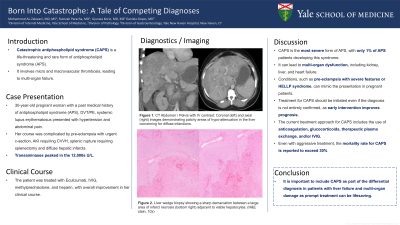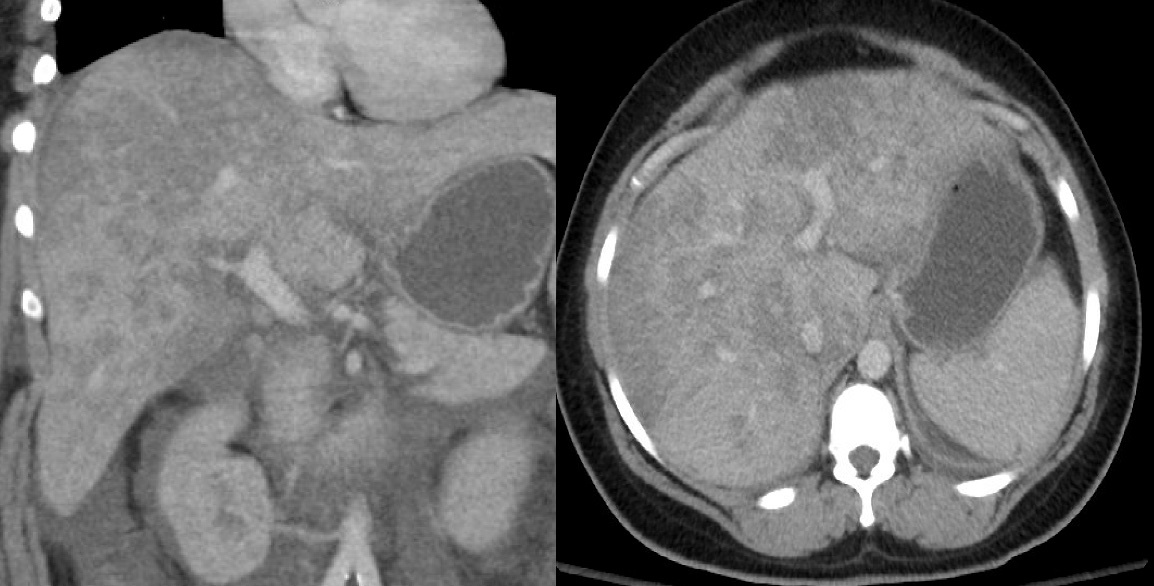Tuesday Poster Session
Category: Liver
P4739 - Born Into Catastrophe: A Tale Of Competing Diagnoses
Tuesday, October 29, 2024
10:30 AM - 4:00 PM ET
Location: Exhibit Hall E

Has Audio
- MA
Mohammed Al-Zakwani, MD, MS
Yale New Haven Hospital
New Haven, CT
Presenting Author(s)
Mohammed Al-Zakwani, MD, MS1, Rumzah Paracha, MD2, Daniela Goyes, MD2
1Yale New Haven Hospital, New Haven, CT; 2Yale New Haven Health, New Haven, CT
Introduction: Catastrophic antiphospholipid syndrome (CAPS) is a life-threatening and rare form of antiphospholipid syndrome (APS). It involves micro and macrovascular thrombosis, impacting multiple organs. Here we present a case of CAPS in a pregnant patient with multi-organ failure, including liver failure.
Case Description/Methods: A 30-year-old pregnant woman with a past medical history of antiphospholipid syndrome (APS) complicated by DVT/PE on anticoagulation, systemic lupus erythematosus, and HELLP syndrome with prior pregnancies, presented with hypertension and abdominal pain. The patient was found to have pre-eclampsia with concerns for HELLP and underwent an urgent cesarian-section. The patient’s hospital course was complicated by an acute kidney injury with refractory hyperkalemia requiring continuous veno-venous hemofiltration, as well as splenic rupture and hemoperitoneum requiring splenectomy. Her liver enzymes continued to worsen post-partum, with transaminases peaking in the 12,000s U/L. Computed tomography scan images showed diffusely heterogeneous hepatic parenchyma with patchy scattered low areas of hypo-enhancement concerning for infarcts. A wedge biopsy of the liver showed necrotic areas with extravasated red blood cells. The initial differential diagnosis was pre-eclampsia with severe features or HELLP syndrome. However, due to the extent of infarcts in the spleen and liver, catastrophic antiphospholipid syndrome (CAPS) became the primary diagnosis. The patient was started on treatment with Eculizumab, IVIG, methylprednisolone, and heparin, with overall improvement in her clinical course.
Discussion: CAPS is the most severe form of APS, with only 1% of APS patients developing this syndrome. It can lead to multi-organ dysfunction, including kidney, liver, and heart failure. Therefore, it is important to include CAPS as part of the differential diagnosis in patients with liver failure and multi-organ damage as prompt treatment can be lifesaving. This is especially true as other conditions, such as pre-eclampsia with severe features or HELLP syndrome, can mimic the presentation in pregnant patients. Treatment for CAPS should be initiated even if the diagnosis is not entirely confirmed, as early intervention improves prognosis. The current treatment approach for CAPS includes the use of anticoagulation, glucocorticoids, therapeutic plasma exchange, and/or IVIG. Even with aggressive treatment, the mortality rate for CAPS is reported to exceed 30%.

Disclosures:
Mohammed Al-Zakwani, MD, MS1, Rumzah Paracha, MD2, Daniela Goyes, MD2. P4739 - Born Into Catastrophe: A Tale Of Competing Diagnoses, ACG 2024 Annual Scientific Meeting Abstracts. Philadelphia, PA: American College of Gastroenterology.
1Yale New Haven Hospital, New Haven, CT; 2Yale New Haven Health, New Haven, CT
Introduction: Catastrophic antiphospholipid syndrome (CAPS) is a life-threatening and rare form of antiphospholipid syndrome (APS). It involves micro and macrovascular thrombosis, impacting multiple organs. Here we present a case of CAPS in a pregnant patient with multi-organ failure, including liver failure.
Case Description/Methods: A 30-year-old pregnant woman with a past medical history of antiphospholipid syndrome (APS) complicated by DVT/PE on anticoagulation, systemic lupus erythematosus, and HELLP syndrome with prior pregnancies, presented with hypertension and abdominal pain. The patient was found to have pre-eclampsia with concerns for HELLP and underwent an urgent cesarian-section. The patient’s hospital course was complicated by an acute kidney injury with refractory hyperkalemia requiring continuous veno-venous hemofiltration, as well as splenic rupture and hemoperitoneum requiring splenectomy. Her liver enzymes continued to worsen post-partum, with transaminases peaking in the 12,000s U/L. Computed tomography scan images showed diffusely heterogeneous hepatic parenchyma with patchy scattered low areas of hypo-enhancement concerning for infarcts. A wedge biopsy of the liver showed necrotic areas with extravasated red blood cells. The initial differential diagnosis was pre-eclampsia with severe features or HELLP syndrome. However, due to the extent of infarcts in the spleen and liver, catastrophic antiphospholipid syndrome (CAPS) became the primary diagnosis. The patient was started on treatment with Eculizumab, IVIG, methylprednisolone, and heparin, with overall improvement in her clinical course.
Discussion: CAPS is the most severe form of APS, with only 1% of APS patients developing this syndrome. It can lead to multi-organ dysfunction, including kidney, liver, and heart failure. Therefore, it is important to include CAPS as part of the differential diagnosis in patients with liver failure and multi-organ damage as prompt treatment can be lifesaving. This is especially true as other conditions, such as pre-eclampsia with severe features or HELLP syndrome, can mimic the presentation in pregnant patients. Treatment for CAPS should be initiated even if the diagnosis is not entirely confirmed, as early intervention improves prognosis. The current treatment approach for CAPS includes the use of anticoagulation, glucocorticoids, therapeutic plasma exchange, and/or IVIG. Even with aggressive treatment, the mortality rate for CAPS is reported to exceed 30%.

Figure: Figure 1. CT Abdomen / Pelvis with IV contrast: Coronal (left) and axial (right) images demonstrating patchy areas of hypo-attenuation in the liver concerning for diffuse infarctions.
Disclosures:
Mohammed Al-Zakwani indicated no relevant financial relationships.
Rumzah Paracha indicated no relevant financial relationships.
Daniela Goyes indicated no relevant financial relationships.
Mohammed Al-Zakwani, MD, MS1, Rumzah Paracha, MD2, Daniela Goyes, MD2. P4739 - Born Into Catastrophe: A Tale Of Competing Diagnoses, ACG 2024 Annual Scientific Meeting Abstracts. Philadelphia, PA: American College of Gastroenterology.
